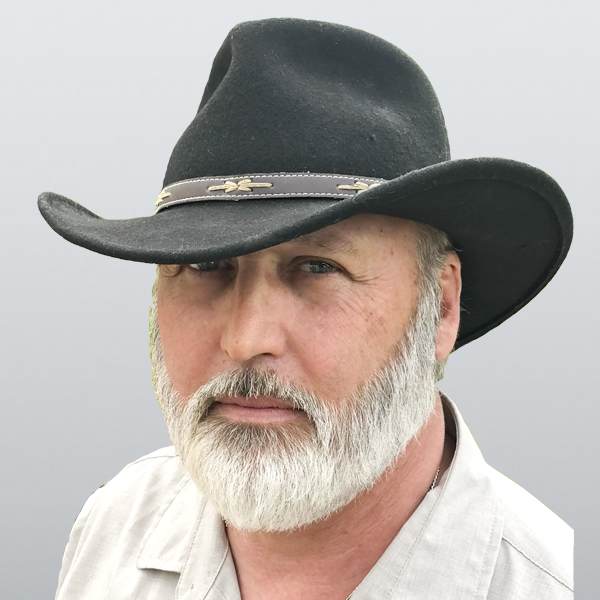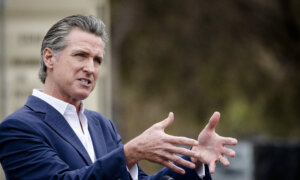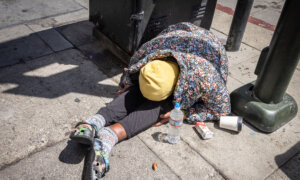Preventive mental health therapy for children may be doing more harm than good—and there’s research to prove it, author Abigail Shrier suggests in her new book “Bad Therapy.”
“What you might not know is that the stuff that travels under the headline ‘mental health’ is really harmful for kids,” she said at a recent book-signing event hosted by the Lincoln Club at Newport Beach. “I’m telling you that according to the best psychological research available, it’s exactly what you would want to do if you wanted to break kids down.”
In “Bad Therapy: Why the Kids Aren’t Growing Up,” which hit The New York Times’ best seller list, Ms. Shrier investigates the mental health industry and its negative impact on children, and concludes that when it comes to preventive therapy—especially for children—more is not always better.
‘Irreversible Damage’
Ms. Shrier’s previous book, “Irreversible Damage: The Transgender Craze Seducing Our Daughters,” led her to the explore the potential harmful effects too much therapy can have on children.
“Irreversible Damage,” exposed the “social contagion” and phenomena behind the sudden spike in the number of teenage girls identifying as transgender.

Abigail Shrier's book “Irreversible Damage” at a book-signing event hosted by the Lincoln Club in Newport Beach, Calif., on March 20, 2024. (Brad Jones/ The Epoch Times)
“Twenty percent of seventh-grade classes were deciding they were transgender, and the terminus of this journey, as they call it, was a double mastectomy and infertility,” Ms. Shrier said.
She knew from talking to parents of gender dysphoric children that gender ideology was a social contagion that was spreading, and that a worldwide controversy was brewing. But, at the time, she said, liberals thought she was “picking on a tiny minority of kids who weren’t harming anyone,” and conservatives were asking her, “Why would you write about that?”
“Nobody wanted to talk about it,” she said.
“Irreversible Damage” lit a political firestorm with the progressive left and remains a cultural lightning rod. The New York Times condemned the book in a review prompting Target stores to pull it from their shelves and triggering some Amazon employees who threatened to quit their jobs in a failed attempt to get the book banned.
The influential book not only shocked parents but it led them to question the gender ideology they discovered was being pushed in schools across America and sparked the parental rights movement across the nation.
‘Bad Therapy’
Ms. Shrier began her latest book, “Bad Therapy,” with a couple of questions: “Why was the generation that had gotten the most treatment, the most wellness techniques, the most regular emotional regulation techniques, the most anti-bullying classes, the most miserable? And, why do they have no interest in growing up?”

Abigail Shrier's latest best-seller, “Bad Therapy: Why the Kids Aren’t Growing Up” at a book-signing event hosted by the Lincoln Club in Newport Beach, Calif., on March 20, 2024. (Brad Jones/ The Epoch Times)
She decided to attend a conference about a multi-tiered system of support devoted to the mental health of children in California.
“I thought I should go and find out what our schools were doing to support the kids I knew were in distress,” she said. “Well, by the end of the three-day conference, I learned that actually every kid is in therapy. They just call it something else. They call it social emotional learning, or anti-bullying classes, and they look a lot like group therapy.”
Ms. Shrier also discovered a whole body of research on the known harms of therapy such as a study of burn victims who left therapy feeling worse than the control group and people who had lost a loved one feeling sadder than those who didn’t go to therapy, she said.
“First responders responding to catastrophe have left therapy feeling worse about themselves and their lives and what they went through than those control groups that didn’t,” she said.
It was then that Ms. Shrier began to realize the symptoms society was seeing in children are “exactly the symptoms you would see in a population that had gotten way, way, way too much therapy,” she said.
Social Emotional Learning
Ms. Shrier went to the schools to find out how social emotional learning, or SEL, is taught to children.
“How do you actually teach SEL? Well, let’s start by sharing a time when you’re happy. Well, that’s boring. Nothing to teach there. Control your joy? Let’s start by all sharing the time when we felt sad, when we felt misunderstood, when we thought we might be bullied,” she said. “Now we’re on a roll. Now we have something for the teachers to teach.”
The problem is that parents are often blamed for the child’s sadness at school because, after all, “Whose job is it to keep kids safe?” she asked.
“So now, we’re criticizing parents,” she said. “It’s completely built into the system. And, I’m not saying that because it’s a conspiracy. I’m just saying, naturally, if you want to teach wellness and emotional regulation, the way to do it is to focus on a time when kids felt sad.”
Ms. Shrier predicts in the book that social emotional learning would lead more children to be sad, anxious, phobic, and alienated from their parents.
When she finished the book in October, Ms. Shrier didn’t know researchers in Australia and England wondered the same thing and were conducting experiments on wellness techniques and anti-bullying, she said.
As it turned out, two new studies showed that “kids ended up being sadder and more anxious, more depressed and more alienated from their parents than the control group,” she said.
Rise of the Expert Class
The rise in the expert class to break down parental authority has been happening for generations, she said.
Society began to regard informal relationships “as hazardous and somewhat sinister,” and instead placed their trust in “experts.”
“So, we didn’t trust grandma as much even though she had raised good kids to adulthood, but to this parenting expert whose oldest child was five, we listened,” she said.
But, while the overtreatment of children who don’t need therapy is causing damage, she said there are still children and adults who do need therapy.
“There are kids who need it. But, if you don’t treat them well, you’re only introducing risk,” she said. “They stand to gain nothing.”
Ms. Shrier stressed that she’s not opposed to therapy or medication.
“If you have a severe phobia and are afraid to leave your house, by all means get the therapy. It will help you leave your house if it’s done right. If you’re so germophobic you can’t shake people’s hands, get the therapy. ... If you have a severely anorexic kid ... get your kid the help they need of course,” she said.

Abigail Shrier discusses her latest best-seller, “Bad Therapy: Why the Kids Aren’t Growing Up” at a book-signing event hosted by the Lincoln Club in Newport Beach, Calif., on March 20, 2024. (Brad Jones/ The Epoch Times)
Parents need to know that therapy for a child is “an entirely different experience than therapy with an adult, because an adult can say to a therapist, ‘Listen, I really appreciated that, but I wouldn’t call my mom emotionally abusive,’ or ‘Listen, I know you’ve said in the past that’s toxic, but I’m not going to cut off my parents,” Ms. Shrier said.
Society now treats a healthy-minded child who is a little worried or a bit anxious by sending them to therapy, exposing them to risks such as increased anxiety, increased depression, alienation from their parents, and demoralization, the feeling that they are limited by a mental health diagnosis, and in some ways the sadness of all treatment dependency, she said.
Children are left feeling that “they can’t do for themselves,” or make decisions, without consulting an expert or an adult, which hinders them from gaining confidence and growing up, she said.
“We’ve never had an American generation that believes less in its ability to rise to a challenge than this one,” she said.
‘They’ve Been Told a Lie’
Ms. Shrier interviewed a young woman who has received preventive, or prophylactic, therapy since she was 6 years old, when her parents divorced. The woman, called Becca in the book, never stopped going to therapy.
Although Becca, now 17, has never been diagnosed with a mental illness, she continues to see a therapist to discuss her “anxiety,” Ms. Shrier said.
When Ms. Shrier asked what Becca and her therapist were currently working on, she replied that the therapist was helping her prepare to make friends in college.
“This is what we’re seeing in the rising generation. They don’t believe they’re up to the basic challenges of adulthood. They think they need a mental health day off,” she said. “They don’t want to have kids or get married either because they think they’re sick. In some ways, it’s the saddest thing of all, because they’ve been told a lie that they’re all mentally ill; it’s just a question of degrees.”
‘Who Objects to Wellness?’
Policies governing therapy are almost always couched in language that makes them difficult to challenge.
“They are always being sold as something you can’t object to, like wellness,” she said. “Who objects to wellness?”
“That’s how all the conversion therapy bans got passed,” she said. “These bans were sold as a way to stop the cruel practice of trying to force gay young people to go straight, but then they slipped in gender identity language,” Ms. Shrier said.
So now, therapists who tell a girl she’s a girl and not a boy can be accused of conversion therapy and lose their license, she said.
Therapeutic Culture
Therapeutic culture has worked its way into “everything,” Ms. Shrier said.
And, while anti-bullying classes may sound like a good idea on the surface, how they’re taught and by whom has side-effects, she suggested.
“You know what you need to do to teach kids not to bully? Teach them right from wrong: ‘Don’t pick on someone smaller than you. Don’t join in,’ and ‘I’m going to be really disappointed if you do. That’s not a behavior we expect in this house. It’s wrong.’ That’s how you teach anti-bullying,” she said.
“You know what you don’t do? Go into a class with a school counselor and teach all the kids they’re so fragile that if anyone says anything they don’t like they’re going fall apart, because now you have kids who don’t believe they can survive anything. That’s what they’ve been told over and over.”
The remedy is simple, she said.
“This is the easiest thing in America to fix. We’ve got a lot of problems, but this one is so easy,” she said. “Mom and Dad can fix it tomorrow. It doesn’t even take any money. You just need to assert your authority and tell kids what’s what. That’s it.”
Children are dwelling far too much and too long on their problems, and not learning how to perform errands and tasks that build confidence, she said.
“If a kid takes his problem to a pastor, or grandma, or an aunt, at some point, the aunt or the grandma is going to say, ‘You’re fine. We’ve talked about this enough. Go play!’” she said. “And guess what a therapist won’t say. ‘You’re fine.’ That’s the problem.”
Almost any activity would be better for children than social emotional learning or “talking about our bad feelings” in schools, she said. “Paint the gym, play ball—they could literally do anything—pick up trash on the side of the highway, and it would be better for them than sitting around talking about their pain,” she said.
It’s “not fair” to children who have gone through a traumatic experience to talk about their pain right before a math test, she said.
“You’re not helping them, but you might convince a kid who hasn’t gone through something really hard that actually they were abused, too,” she said.
How Much Therapy is Too Much?
Ms. Shrier told The Epoch Times in an interview that while researching “Irreversible Damage” she realized that at the core of the “social contagion” she exposed were the children’s therapists and school counselors.

Abigail Shrier at a book-signing event hosted by the Lincoln Club in Newport Beach, Calif., on March 20, 2024. (Brad Jones/ The Epoch Times)
“In almost every case, a kid had a therapist or school counselor that encouraged them in the idea that they might be transgender,” she said.
It was “obvious and disturbing” that mental health professionals had left children “worse off or introduced a new problem,” she said.
Since too much therapy can increase anxiety and depression, “it can introduce new symptoms, like the idea that you can have gender dysphoria,” she said.
Ms. Shrier interviewed Arthur Barsky, a professor of psychiatry at Harvard Medical School and world expert on illness anxiety disorder, somatic symptom disorder, or what used to be called call hypochondriasis—the condition afflicting hypochondriacs.
Mr. Barsky, she said, told her hypochondriasis isn’t about people imagining pain, but rather hyperfocusing on the normal pains we all feel.
“If you make that an organizing principle of your life, the pain will magnify,” she said. “That’s what these kids are doing to their emotional lives.”
Today’s children, many who are leading unhealthy lifestyles, think the solution must be diagnosis, therapy, or medication, but too much therapy has led them to every kind of diagnosis, including gender dysphoria, Ms. Shrier said.
Parents ‘Terrified’
‘Helicopter moms,’ the term for overprotective parents who hover over their children fearing they will be traumatized at school or away from home, have given rise to a new generation of parents who are even more afraid, according to Ms. Shrier.
“They’re frantic,” she said. “It’s much worse than helicoptering. It’s surveillance parenting.”
These parents “are actually tracking their kids with an app on their phones,” and calling teachers demanding their children not be seated next to students who might hurt their feelings, she said.
“They’re calling coaches. They’re calling bosses,” she said.
And they’re convinced they must protect their child from being “called a bad name at elementary school” because if they don’t the trauma will devastate them, she said.
“They can never look away,” she said. “They’re terrified of emotional injury. They’re terrified of bullying.”
‘Surveillance Parenting’
While generations of older Americans, including conservative opinion hosts, have mocked the rising generation, often calling them “snowflakes” who need “safe spaces” and “therapy dogs” so they don’t melt over comments they find offensive, Ms. Shrier says the problem runs much deeper than thin-skinned youth.
“It’s worse than that,” she said. “Kids are not able to deal with normal problems in adult life because they’re genuinely believing themselves sick.”
American society has been immersed in trauma and therapy culture for more than a generation, and its effects are “profound,” she said.
“Now kids don’t say ‘I’m shy,’ they say ‘I have social phobia.’ They don’t say ‘I’m worried,’ they say ‘I have anxiety.’ They don’t say ‘I feel sad,’ they have depression,” she said. “That is proof that they were swimming in the language of psychopathology.”
These parents bought into the notion that preventive therapy was an innocuous intervention, “but it’s not,” she said.
“It’s false. It’s never been true, but they believed that,” Ms. Shrier said. “Where did they get that idea? They’d all been teased, they’d all been neglected, they’d all had their hearts broken, so why did they become convinced in one generation that their children couldn’t survive that?”
The answer: “Because the experts told them.”
This parental generation trusted the mental health experts and believed the “trauma narrative” they were selling, she said. Some became “obsessed” with normal problems children face at school because they grew up to think everybody can use therapy like “a mental tune-up,” even though there is a body of research called iatrogenesis “when a healer introduces a harm.”
Most parents weren’t aware of the negative side effects therapy can cause, especially for children who don’t need it, Ms. Shrier said.

Abigail Shrier discusses her latest best-seller, “Bad Therapy: Why the Kids Aren’t Growing Up” at a book-signing event hosted by the Lincoln Club in Newport Beach, Calif., on March 20, 2024. (Brad Jones/ The Epoch Times)
Preventive Mental Health
Some of this therapeutic culture stems from rising divorce rates over the last few decades.
“A lot of us went to therapy as adults and we thought that really helped, and we assumed it would be the same for a kid,” she said. “It’s not.”
Mental health experts—the American School Counseling Association, the National Association of School Psychologists, the American Psychological Association—that had nothing to say as children headed into the second academic year of lockdowns during the COVID-19 pandemic, when the lockdowns were “the most obvious detriment to kids’ mental health,” she said, “now present themselves as the cure.”
These mental health experts behave more like groups that want to enrich themselves than people who are “actually trying” to help the mental health of children, she said.
“Now, if you need therapy, if you have a disorder, if you have a real problem, it’s worth the risk. It’s when you don’t have a problem, that you only stand to face the risk because you don’t stand to benefit,” she said. “So, I’m not against treatment. What I’m against is what they call ‘preventive mental health,’ which has no proven track record of helping anybody. And, by the way, of course it can’t. It’s treating people who don’t have a problem.”













